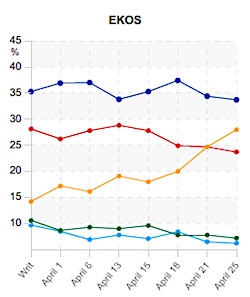26 Apr What the hell is happening?
 Ekos Research Associates, in a national poll with 2,783 respondents and a sampling error margin of 1.8 percentage points 19 times out of 100, has the NDP in second place nationally, as the Dips’ Quebec surge spreads to the rest of the country. The numbers are CPC 33.7; NDP 28.0; Liberal 23.7; Green 7.2; Bloc 6.2. What’s more, Ekos projects just 131 CPC seats vs. 100 for the NDP, 62 for the Liberals, and just 14 for the Bloc. Moneyquote:
Ekos Research Associates, in a national poll with 2,783 respondents and a sampling error margin of 1.8 percentage points 19 times out of 100, has the NDP in second place nationally, as the Dips’ Quebec surge spreads to the rest of the country. The numbers are CPC 33.7; NDP 28.0; Liberal 23.7; Green 7.2; Bloc 6.2. What’s more, Ekos projects just 131 CPC seats vs. 100 for the NDP, 62 for the Liberals, and just 14 for the Bloc. Moneyquote:
Looking at these seat projections, the NDP and the Liberal Party combined would have a majority and 31 more seats than the Conservatives (as well as nearly 20 more points in popular vote). Indeed, It is hard to imagine how these totals would not produce the once unimaginable outcome of a Jack Layton led coalition government deposing Stephen Harper’s Conservative government.
Take a Valium and drink lots of caveats, of course. But something does seem to be up. The conventional wisdom has been that a nearly even split between the Liberals and the NDP would cinch a majority for Harper. Last Thursday, a perspicacious post by Elly Alboim, who may be Canada’s most experienced election observer, threw cold water on that assumption. His main points:
- More often than not, these sorts of break outs cannot be reversed.
- Often, the final results overshoot the initial wave.
- Even last week’s numbers would produce far more NDP seats than most realize.
- In a wave where voters are motivated, they make their way to the pollseven without slick get-out-the-vote operations
- Anti-Harper gains in one province (Quebec) can reverberate in others (Ontario, BC and elsewhere)
- In Ontario, it will take a very sizeable surge to win the NDP seats.
- Disparities between party preference and leader preference tend to narrow by voting day.
Alboim, who has covered 44 federal and provincial elections, observes:
I’ve been involved in dozens of CBC projection meetings where seasoned political reporters said that it was inconceivable that certain ridings and personalities were lost. And yet they were. Canada is littered with former cabinet ministers who never should have lost. Some examples: Roy Romanow fell to a gas station attendant in her 2os. In the same election, the CBC did not put a mobile in Grant Devine’s riding in order to save money because his Tories could not possibly win. Richard Hatfield was speechless the night he lost 58-0 to Frank McKenna– there were ridings that turned for the first time ever.
Read the whole thing on the Carleton University Journalism School’s excellent election blog.
